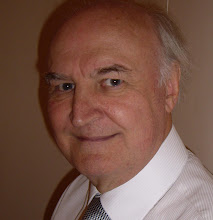
Not existing in and for itself,
beauty's purpose is to enthral, entice,
to stimulate and select (or reject)
a victim, ripe for joyful sacrifice.
For the bee, the glory of the meadow
represents a tableau full of nectar,
where other species dine together,
with lepidoptera and vile insecta.
In the poet's eye, the field becomes
a woman, whose delights are needlessly
elaborated by mythology:
cornflower eyes, poppy lips and such fancies.
Flora or Blodeuwedd lie spread before him,
invitingly humped in a summer bed,
while neglected in the milking shed sits
plump Lucy, wondering if he's lost his head.
Function and form amply displayed, Lucy
squeezes and pumps milk from swollen teats,
sweats and dreams of lusty swains, she hopes
will deliver her from lactating drains.
Poet and Lucy remain unsatisfied
because they are tied to dreams of love and
beauty all confused with work and duty.
So, discard pen and bucket and go to it.
But what conspiracy lies behind that art?
The dark glistening eyes, the downcast glance,
the bitten lip and blushing modesty that
transforms country tart to sweet Aphrodite.
Behind nature's arras squirms the culprit,
an uneasy chariot of ancient germs,
aided and abetted by the senses
retarded by the horses of the mind.
The arts of poetry and dance conspire
to hinder that inglorious conjunction,
that crux of irresistible desire
to join opposites in form and function.
Beguiled by sphere and dodecahedron,
Platonic aesthetes preferred completion;
they could not stand nature's unruly plan,
so inconsistent with the mind of man.
Incompleteness, then, is the mysterious key,
rather than proportion or symmetry.
Aristotle would have rather dined on slugs,
than sip nectar from Lucy's ovoid dugs.
The pelvic thrust of young Perseus, cast
by Cellini, was designed to excite
the lust of the Florentine pederast,
not ignite Aphrodite's sacred flame.
The fruit of Bacchus' lips proclaim too
Carravagio as lover of the pretty toy,
and Michelangelo's boy hero David
slayed more than Dan's tribal bugaboo.
Beauty, then, is the hidden mask of desire,
a lurking fire in a thousand places,
burning in each weeping eye, the traces
of some primaeval ire still not snuffed out.
But good taste is the sine qua non of art,
woe betide those who neglect the critic's part
in blocking the poet's tendency to employ
the squalid bits of nature's inventory.
To the youthful eye, the morning's pleasure
sounds no alarms of gravid pains to come,
but charms and adds value to a treasure
that may grow heavy with the setting sun.
And so as evening falls and our poet fails
to capture glowing tales of beauty,
garnered from his wordy fields of clover,
may chance to see Lucy bending over.
In a flash, the truth he sees, between
the nice proportions of her knees,
and glib theories of rhyme and metre are
cast aside like the curtain of love's theatre.
Stumbling forward with inarticulate cries,
he grasps the weary milkmaid round her thighs
unbuckles all his mental blocks, wails "fuck it!"
and falls headlong into Lucy's bucket.
*******

No comments:
Post a Comment